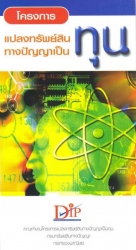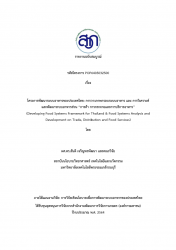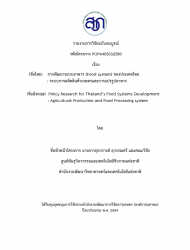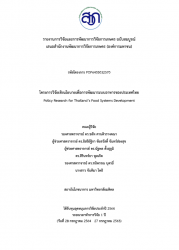
Author : ทรัพย์สินทางปัญญา, กรม
Publishing Date : Jul 21, 2023
การจัดทำหนังสือเล่มนี้ เพื่อนำเสนอเส้นทางท่องเที่ยว
แนวใหม่ของจังหวัดนครนายก และฉะเชิงเทรา สัมผัสกับธรรมชาติ
น้ำตก ซีวอล์กแห่งแรก คาเฟ่เปิดใหม่
ชม ชอป สินค้าภูมิปัญญาท้องถิ่น คุณค่าทรัพย์สินทางปัญญาชุมชน
ซึ่งได้จัดทำในรูปแบบวีดีโอ โดยเพจชื่อดัง
“ท่องเที่่ยวสะดุุดตา” และเผยแพร่ผ่านช่องทางออนไลน์
ไปสู่สาธารณชนอย่างกว้างขวาง
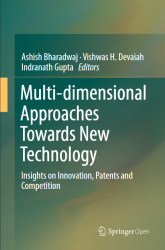
Author : Bharadwaj, Ashish
Publishing Date : May 15, 2023
This open access edited book captures the complexities and conflicts arising at the interface of intellectual property rights (IPR) and competition law. To do so, it discusses four specific themes: (a) policies governing functioning of standard setting organizations (SSOs), transparency and incentivising future innovation; (b) issue of royalties for standard essential patents (SEPs) and related disputes; (c) due process principles, procedural fairness and best practices in competition law; and (d) coherence of patent policies and consonance with competition law to support innovation in new technologies. Many countries have formulated policies and re-oriented their economies to foster technological innovation as it is seen as a major source of economic growth. At the same time, there have been tensions between patent laws and competition laws, despite the fact that both are intended to enhance consumer welfare. In this regard, licensing of SEPs has been debated extensively, although in most instances, innovators and implementers successfully negotiate licensing of SEPs. However, there have been instances where disagreements on royalty base and royalty rates, terms of licensing, bundling of patents in licenses, pooling of licenses have arisen, and this has resulted in a surge of litigation in various jurisdictions and also drawn the attention of competition/anti-trust regulators. Further, a lingering lack of consensus among scholars, industry experts and regulators regarding solutions and techniques that are apposite in these matters across jurisdictions has added to the confusion. This book looks at the processes adopted by the competition/anti-trust regulators to apply the principles of due process and procedural fairness in investigating abuse of dominance cases against innovators.
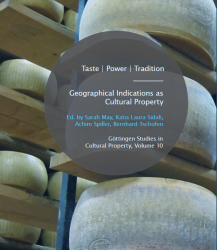
Author : Taste | Power | Tradition - Geographical Indications as Cultural Property
Publishing Date : May 11, 2023
The idea of origin in terms of space and culture as a special indicator of quality is one of the most influential strands in contemporary food. It impacts on politics, economics and everyday life – and it connects these fields with complex relations of power and culture. With geographical indications, the EU offers an instrument which allows for the declaration of specialties, qualified by their tradition, as typical for a defined area. The declaration serves to protect these products as intellectual and collective property and presents them as culinary heritage, thereby enabling sale at an added value. Accordingly, the EU instrument of geographical indications evokes the interests of a variety of disciplines, such as (agricultural) economics, (social) geography, sociology, anthropology and law. Nonetheless, dialogue and cooperation among the disciplines are quite rare. “Taste | Power | Tradition” gives an insight into this multidisciplinary debate and brings together empirical data and theoretical reflections from different perspectives.
The idea of origin in terms of space and culture as a special indicator of quality is one of the most influential strands in contemporary food. It impacts on politics, economics and everyday life – and it connects these fields with complex relations of power and culture. With geographical indications, the EU offers an instrument which allows for the declaration of specialties, qualified by their tradition, as typical for a defined area. The declaration serves to protect these products as intellectual and collective property and presents them as culinary heritage, thereby enabling sale at an added value. Accordingly, the EU instrument of geographical indications evokes the interests of a variety of disciplines, such as (agricultural) economics, (social) geography, sociology, anthropology and law. Nonetheless, dialogue and cooperation among the disciplines are quite rare. “Taste | Power | Tradition” gives an insight into this multidisciplinary debate and brings together empirical data and theoretical reflections from different perspectives.
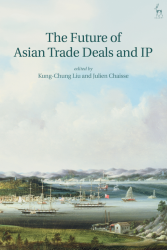
Author : Liu, Kung-Chung; Chaisse, Julien
Publishing Date : Mar 24, 2023
The first part of this open access book sets out to re-examine some basic principles of trade negotiation, such as choosing the right representatives to negotiate and enhancing transparency as a cure to the public’s distrust against trade talks. Moreover, it analyses how the Comprehensive and Progressive Agreement for the Trans-Pacific Partnership (CPTPP) might impact on the Regional Comprehensive Economic Partnership's (RCEP) IP chapter and examines the possible norm setters of Asian IP. It then focuses on the People's Republic of China's (PRC) trade and IP strategy against the backdrop of the power games between the PRC, India and the US. The second part of the book reflects on issues related to investor–state dispute settlement and its relationship with IP, such as how to re-calibrate the balance in international investment arbitration, and whether compulsory license of IP constitutes expropriation in India, the PRC and select ASEAN countries. The third part of the book questions and strives to improve some of the proposed IP provisions of CPTPP and RCEP and to redefine some aspects of international IP norms, such as: pre-grant patent opposition and experimental use exception; patent term extension; patent linkage and data exclusivity for the pharmaceutical sector; plant variety protection; pre-established damages for copyright infringement; and the restructuring of copyright limitations in the public interest. The open access edition of this book is available under a CC BY-NC-ND 3.0 licence on bloomsburycollections.com. Open access was funded by the Applied Research Centre for Intellectual Assets and the Law in Asia, School of Law, Singapore Management University.

Author : Velásquez, Germán
Publishing Date : Mar 22, 2023
This open access book is a collection of research papers on COVID-19 by Germán Velásquez from 2020 and early 2021 that help to answer the question: How can an agency like the World Health Organization (WHO) be given a stronger voice to exercise authority and leadership? The considerable health, economic and social challenges that the world faced at the beginning of 2020 with COVID-19 continued and worsened in many parts of the world in the second-half of 2020 and into 2021. Many of these countries and nations wanted to explore COVID-19 on their own, sometimes without listening to the main international health bodies such as WHO, an agency of the United Nations system with long-standing experience and vast knowledge at the global level and of which all countries in the world are members. In this single volume, the chapters present the progress of thinking and debate — particularly in relation to drugs and vaccines — that would enable a response to the COVID-19 pandemic or to subsequent crises that may arise. Among the topics covered: COVID-19 Vaccines: Between Ethics, Health and Economics Medicines and Intellectual Property: 10 Years of the WHO Global Strategy Re-thinking Global and Local Manufacturing of Medical Products After COVID-19 Rethinking R&D for Pharmaceutical Products After the Novel Coronavirus COVID-19 Shock Intellectual Property and Access to Medicines and Vaccines The World Health Organization Reforms in the Time of COVID-19 Vaccines, Medicines and COVID-19: How Can WHO Be Given a Stronger Voice? is essential reading for negotiators from the 194 member countries of the World Health Organization (WHO); World Trade Organization (WTO) and World Intellectual Property Organization (WIPO) staff participating in these negotiations; academics and students of public health, medicine, health sciences, law, sociology and political science; and intergovernmental organizations and non-governmental organizations that follow the issue of access to treatments and vaccines for COVID-19.
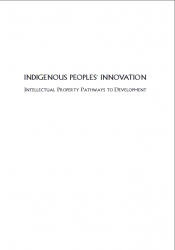
Author : Drahos, Peter; Frankel, Susy
Publishing Date : Mar 22, 2023
Traditional knowledge systems are also innovation systems. This book analyses the relationship between intellectual property and indigenous innovation.
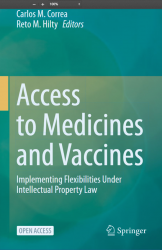
Author : Correa, Carlos M., Hilty, Reto M.
Publishing Date : Mar 20, 2023
This open access book is the outcome of a Global Forum on Innovation, Intellectual Property and Access to Medicines held in December 2019 at the Max Plank Instititute in Munich, organised by the South Centre and the Max Plank Institute. The academics and experts from international organisations participating have contributed chapters to this book. The book is for policy makers (in Ministries of Health, Ministries of Trade, Ministries of Foreign Affairs, patent offices), but also relevant for academics (law, trade, public health), on the flexibilities available in the Agreement on Trade Related Aspects of Intellectual Property Rights (TRIPS) of the World Trade Organization to promote access to medicines.
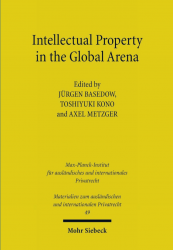
Author : Kono, Toshiyuki; Basedow, Jürgen; Metzger, Axel
Publishing Date : Mar 20, 2023
The private international law of intellectual property is currently much debated both in Europe and abroad. Art. 8 of the Rome II Regulation of 2007, which codifies a territorial approach for the infringement of intellectual property, has provoked an intensive discussion in Europe as to whether the lex loci protection is still appropriate for intellectual property litigation in the age of worldwide networks. A condensed outcome of this debate is summarized in the »Principles for Conflict of Laws in Intellectual Property« (CLIP Principles) drafted by the European Max Planck Group on Conflict of Laws in Intellectual Property (CLIP), published recently in a second preliminary draft. On the international scale, the American Law Institute's »Intellectual Property: Principles Governing Jurisdiction, Choice of Law, and Judgments in Transnational Disputes« of 2007 (ALI Principles) are the focal point of the debate. A Japanese project (»Transparency Proposal«) was finalized in 2009. This volume provides a comparative analysis of the three proposals. It compiles papers presented at an international conference held in Tokyo in May 2009.
123NextLast

